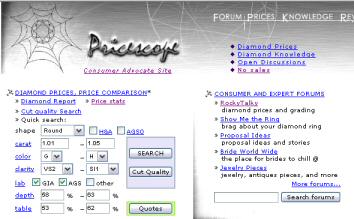Democratic Branding - An Interview with Leonid Tcharnyi of Pricescope
March 24, 05
What started off as a web crawler, a search site that lists websites that sell diamonds, is now a very active hub for lively discussions on diamonds and jewelry - Pricescope.com. Consumers and industry members share in its forums a wealth of information, and this is where the industry can talk directly with consumers and learn what’s on its mind, but learn too.
 |
The man behind Pricescope is Leonid Tcharnyi, perhaps an odd bird in the diamond industry. He does not come from a family of diamond traders or from a long line of jewelers, nor was he ever aspiring to become a gemologist. None the less, the PhD scientist built and runs one of the most popular consumer information web sites on diamonds - pricescope.com.
In 2000, after moving to Canada via Finland, Moscow-born Tcharnyi realized there were plenty of sites that sold diamonds and diamond jewelry online, and came up with the idea of creating a site that would compare diamond prices from multiple online sources.
“Luckily I didn’t find any investors during the hi-tech boom,” he jokes today “and funded the company on my own,” meaning that he not only did all the programming, or that he and his wife are the only two employees of the company, but that business plans predict the future poorly.
He started building the price comparison site, and that aspect of the site is working strong till this day, with online sellers like
However a mention he made in a public forum on Rapnet that he had launched a price comparison site created an unexpected outcome.
An Australian jeweler called Garry Holloway visited his site as a result of this mention and a dialogue between the two started. Pretty quickly Holloway wrote for Pricescope all the background information on diamonds and the diamond industry, creating the most advance online tutorial on the subject.
People started flocking to the site and today it has 150,000 unique visitors a month, writing an average of 500 – 600 messages daily in the forums. On rare occasions, the number of messages rises to 800, making them some of the busiest forums in the diamond industry.
This gives Tcharnyi some insight as to what the online diamond consumer is concerned about; a fear of being ripped off. He says that between the media and crooked jewelers, many developed mistrust to jewelers.
With 70 – 75 percent of buyers doing their research online and then buying in stores, jewelers and jewelry store employees need to be knowledgeable. Without that knowledge they won’t gain a buyers' trust (an IDEX Magazine investigation last year found that store employees were often clueless about diamond issues concerning buyers, including Conflict Diamonds, with one saying all their diamonds “come from
Democratic Branding
Naturally, in this kind of environment, he feels the role of consumer sites is not simply to help consumers, but to bridge the trust gap between seller and consumer.
This, in turn, creates an opportunity for the best (not just any) vendors to reach out to consumers and develop trust, a relationship, brand and more.
“A smart jeweler will engage in discussion with consumers in the forums and there build his brand. People will judge your style, tone, reaction to criticism and sincerity – and this builds your name and credibility,” he says, calling it “Democratic Branding”. You can’t say ‘I’m honest’ and expect people to buy it. If a jeweler is willing to address concerns raised by consumers wary of dishonest jewelers, a trust can be built.
In the eyes of examining consumers it is precisely this public, exposed, at times uneasy environment, that serves as a great testing ground for who you are and what you are made of - as a bare human - before being examined as a jeweler. If you pass this public inspection you gain important credit, and resulting business.
“My intentions are not to harm the industry,” he stresses. “Consumers complain about bad experiences. If a jeweler responds to the criticism – that is good branding. You’ll see other consumers, with a positive experience with that jeweler, come to his aid!” This creates willingness on the part of buyers to pay more – for the trust, he adds.
His tip to jewelers who are considering being active in the industry forums? An informal, human voice works better than ‘corporate statements’ that people don’t trust and don’t pay attention to.